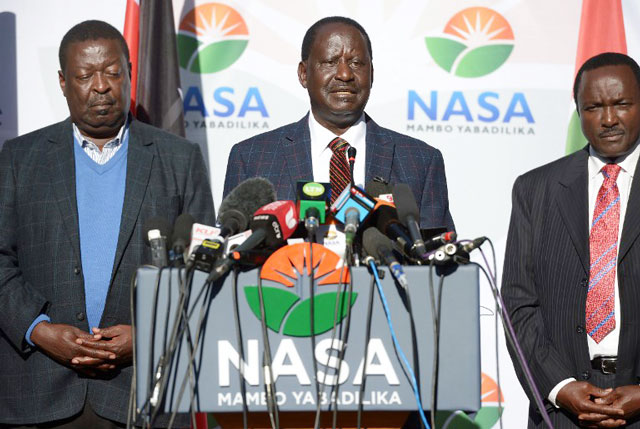
Nairobi, Kenya | AFP | Judges at Kenya’s Supreme Court on Monday began hearing an opposition petition challenging the result of the August 8 presidential election.
The seven judges have until September 1 to rule in the case in which opposition leader Raila Odinga alleges computer hacking and fraud handed victory to incumbent President Uhuru Kenyatta.
On Monday the court permitted lawyers for Odinga’s National Super Alliance (NASA) coalition to have access to the computer servers and electronic voter kits of the Independent Electoral and Boundaries Commission (IEBC) in order to prove their allegations that the results were fiddled.
“The commission has nothing to hide,” said IEBC lawyer Paul Muite.
Odinga himself was among those inside the packed court on Monday morning, while outside police had deployed in large numbers. Proceedings were televised live on various Kenyan media channels and followed eagerly.
James Orengo, a senior NASA official and lawyer, told the court that the alleged irregularities “cannot be considered as minor transgressions” leaving the result in question and requiring the annulment and rerunning of the vote.
Another opposition lawyer, Otiende Amollo, said tally sheets had been doctored in “a consistent pattern, that is: increase the votes for Uhuru Kenyatta and decrease the votes for Raila Odinga.”
– ‘Brutal crackdown’ –
Odinga challenged his last election defeat in 2013, but lost in court. In 2007 widespread and violent street protests followed the declaration of Odinga’s loss and on Monday a rights group said police had once again used excessive force to crush opposition protests following this month’s vote.
“The brutal crackdown on protesters and residents in the western counties, part of a pattern of violence and repression in opposition strongholds, undermined the national elections,” said Otsieno Namwaya, Africa researcher at Human Rights Watch (HRW).
“People have a right to protest peacefully, and Kenyan authorities should urgently put a stop to police abuse and hold those responsible to account.”
HRW said police shot some people dead, wounded others, raped women and stole property while putting down the protests in parts of the country following opposition allegations of rigging.
At least 12 people were killed in the west of the country, including the city of Kisumu, HRW said, and more than 100 people were injured, but it added the true figure “is most likely much higher” as victims and relatives are reluctant to speak out.
An AFP tally of the dead now stands at 21 nationwide.
Actions against protesters included “unlawful killings and beatings by police during protests and house-to-house operations”, HRW said, adding there were at least three cases where women alleged police had raped them.
Namwaya said investigations must be carried out and responsible officers prosecuted. So far the government has denied using excessive force against protesters.
“With tensions still running high as the country awaits the court’s decision on the opposition’s petition, Kenyan authorities need to be vigilant in preventing more police abuses and upholding the right to peaceful protest,” Namwaya said.
“Kenyans should be able to express their grievances without being beaten or killed by police.”
 The Independent Uganda: You get the Truth we Pay the Price
The Independent Uganda: You get the Truth we Pay the Price





